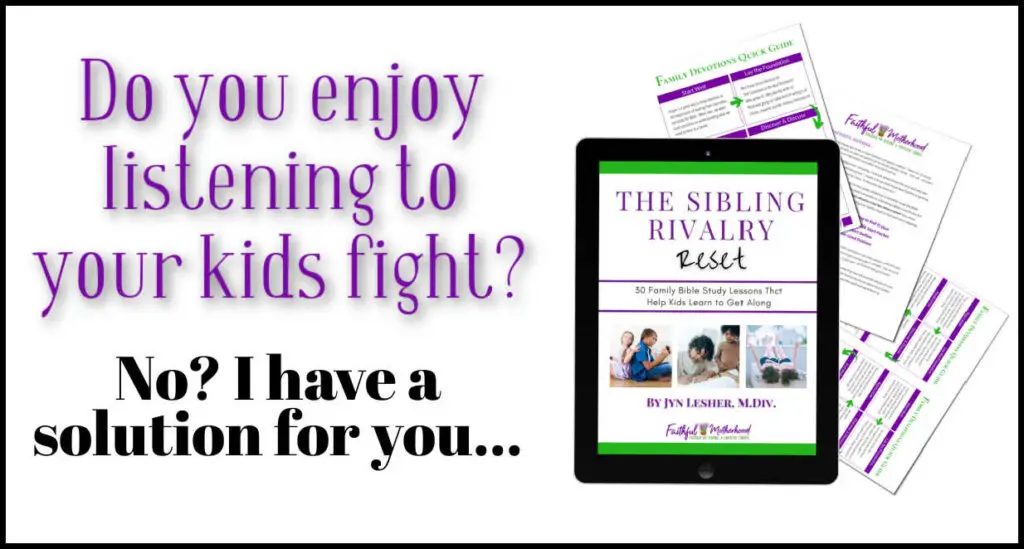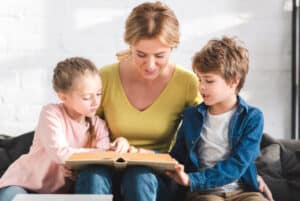Homeschooling can be an overwhelming task. When you accept the call to teach your child, it is your responsibility to determine what all they need to know and then figure out how to teach it.
There are hundreds of curriculums out there that clamor for your attention and promise to solve the problem of what to teach. The truth is that there are more facts and information out there than you could possibly show your children.
Teach the Skills of Learning
Your first and most important task is to teach them the skills of learning. The skills of learning are:
-
How to Memorize
-
How to Read
-
How to Write
-
How to Think
We practice the skills of learning as we discover new content and new information about the world around us. Our students continue to refine and grow in these skills of learning as they research the world around them and write about important ideas. As home educators, we are raising life-long learners who continue to learn and grow even after they are out of school.
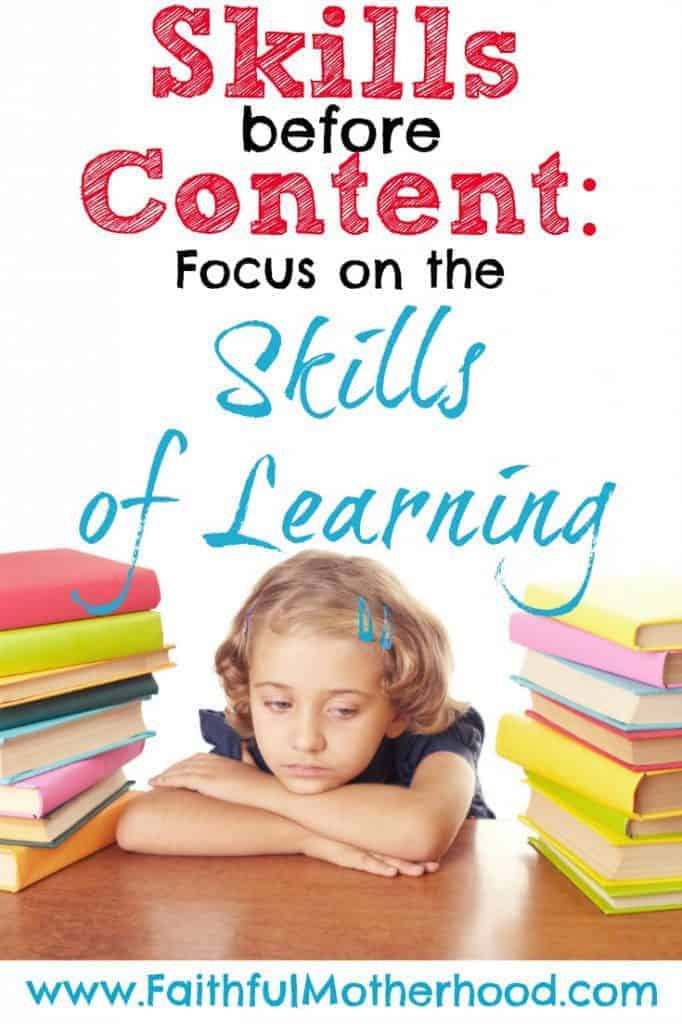 Skill of Learning #1: How to Memorize
Skill of Learning #1: How to Memorize
The foundation of all learning is memorization. Memorization is a skill, not a gift. The skill of memorization should be nurtured and developed. It is like a muscle that grows as we use it, allowing us to memorize more information with increasing speed and understanding. There are different tricks and techniques that we learn to stretch and grow those memorization muscles as time goes on.
The keys to building muscles are the same for building memorization skill – frequency and intensity. Intense and frequent sessions will help students commit essential facts, figures, and sayings to memory.
Those memorization pieces of information serve as memory pegs in the minds of our students. As they encounter more information, they make connections between these pegs of information. New information is more likely to stick because there is a peg there to hang that new information on – a connection is made.
Developmentally this is the perfect place to start the educational journey of our young children. Before you can read, you have to memorize the sounds of the letters of the alphabet. Then, the emerging reader starts to connect those sounds together.
Children naturally start memorizing all kinds of information and then start making connections between that information. Young children are sponges. Have you ever marveled at how they can learn a song full of information so quickly? God has wired their brains to observe readily (why? why?) and absorb the world around them.
Learning another language begins with memorization. The student memorizes new words and starts adding to his vocabulary. From what was previously a babble of sounds, a language starts to appear as the students can hear different words that they have memorized. These new words are like pegs in the sentence that equip the language student to decipher the meanings of the unknown words. Memorization provides that vital first tool in learning a new language or subject.
Learn more about the skill of memorization in this post: “How to Memorize the Books of the Bible” It is chalked full of great memorization tips and strategies. If you need convincing on the power of memorization, then read “Why We Need to Memorize the Books of the Bible.” There are tons of practical memorization skills included in “Memorize the Books of the Bible.”
Key Skill #2 : How to Read
The skill of reading begins with learning the sounds of letters and grows into grouping those sounds together into words. From there fluency increases as we add more and more vocabulary. We explore and learn about different types of stories.
We discover that authors write stories to make a point and teach a lesson. Discussion evolves over what that meaning is and what we think about those ideas. Learning to read with discernment and seeking truth, goodness, and beauty is the ultimate goal of good reading.
Careful reading is also the key to self-teaching. Our modern education system is set up for students to receive from an expert telling them the information. Skilled and careful readers can digest information from primary sources directly. We don’t want to be dependent on “experts” but rather to evaluate the sources and arguments for ourselves.
Skill of Learning #3: How to Write
Writing is a skill as well. Everyone can learn to write well. We teach our children to write in the same style and way that Benjamin Franklin taught himself to write.
Start first with a well-written short paragraph and practice re-writing that piece in your own words. Then, we use different dress-up and additions to make our writing even better. (For our curriculum, we use the Institute in Writing Excellence writing program. I cannot speak highly enough about it.)
Once the basic skills of writing are mastered, the student can then move on to more creative writing rather than the re-writing of someone else’s material. Reshaping and improving sentences is one set of writing skills. Creating fresh content is an entirely different set of skills. Far too many teachers ask students to do the later when they are not developmentally ready. It is like patting your head with one hand and rubbing your tummy with the other.
Researching a subject and writing about it is how new knowledge and information is acquired and added to our child’s knowledge base. The practical application of reading, researching, and writing create an interaction with the material that promotes learning that sticks.
The creation of new content is a skill set as well that everyone can learn. Everyone can be taught how to research, organize, and write a scientific research paper. Everyone can be taught the skills necessary to brainstorm what to say and to organize and present those ideas in a way that is persuasive.
I tell my children, and my students at our homeschool co-op, that if you can speak and write well – people will assume you are smarter than you are and will listen to you. These are important life and vocational skills that are not well-practiced in today’s world.
Key Skill #4: How to Think
When we practice writing well, over and over again, shapes how we think. It helps to organize our thinking in subconscious ways. In contrast to a stream of consciousness world, organized thinking stands out.
The practice of good writing natural trains your mind to choose just a few main points. Your brain is also training to filter out those arguments that are not as strong in making your point.
Good writing is meant to be persuasive and thus naturally flows into working on the presentation skills necessary to complement your persuasive writing. Our learning and work are directed toward the good, the beautiful, and the true. We want to think clearly so that we can recognize these things.
We need to communicate clearly and persuasively so that we can draw others to these core values as well. Ultimately, as Christian parents, our goal is to raise disciples that can communicate the gospel with clarity and passion.
Writing well is everything because
‘writing well is at the same time
perceiving well, thinking well & saying well.’”
– Gustave Flaubert quoted in The Question
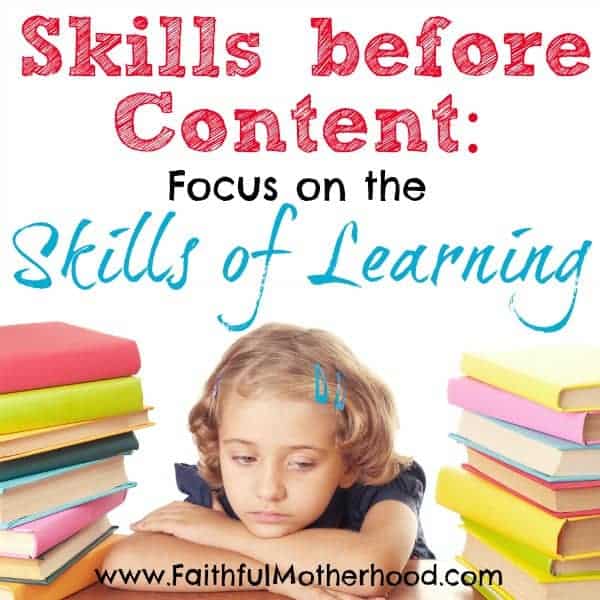
The Freedom of the Skills of Learning
The skills of learning are the key skills our students need to practice and master before heading off to college or life after high school. If they practice these skills well, they will cover an incredible amount of content. Better still they will remember and understand even more as well.
Remember that we are not putting out finished products, but rather humble, life-long learners. If we teach our children, how to learn – they will be able to learn anything that we forgot or didn’t get to while under our care. Our students will also be equipped to discover their passions and to equip themselves for whatever God calls them to do.
Dear overwhelmed homeschool mom, keep your homeschooling focused. There will be seasons where homeschooling is more trying from challenges such as pregnancy, moving, sickness, caregiving, etc. Don’t lose hope and don’t give up.
Focusing on the key skills, rather than having to cover an arbitrary about of content, will preserve your sanity and help you focus on the relationships which are the key to authentic learning.
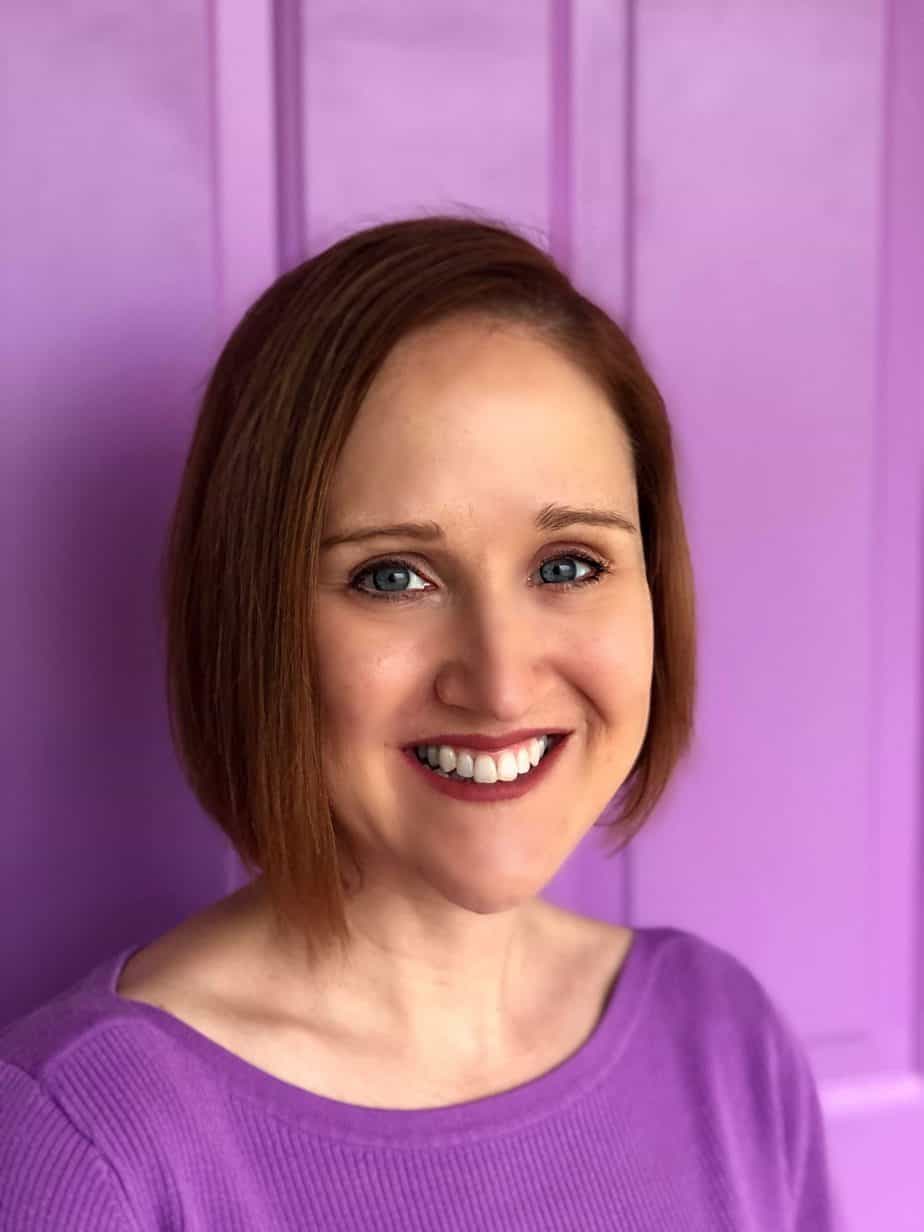
The voice behind FaithfulMotherhood.com is Jyn. She is a veteran homeschool mom of three. More than just a pastor’s wife, she holds a Master of Divinity degree and has served in church leadership for over 20 years. Her passion is equipping parents to live out their calling as the number one faith influencer for their children. She longs to see moms empowered by God’s Word and transferring that love to their children through daily Bible study and family devotions.

